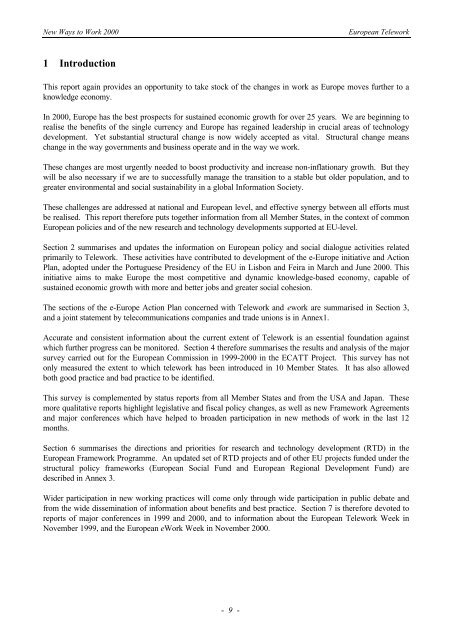eWORK 2000 - European Telework Week
eWORK 2000 - European Telework Week
eWORK 2000 - European Telework Week
- No tags were found...
Create successful ePaper yourself
Turn your PDF publications into a flip-book with our unique Google optimized e-Paper software.
New Ways to Work <strong>2000</strong><strong>European</strong> <strong>Telework</strong>1 IntroductionThis report again provides an opportunity to take stock of the changes in work as Europe moves further to aknowledge economy.In <strong>2000</strong>, Europe has the best prospects for sustained economic growth for over 25 years. We are beginning torealise the benefits of the single currency and Europe has regained leadership in crucial areas of technologydevelopment. Yet substantial structural change is now widely accepted as vital. Structural change meanschange in the way governments and business operate and in the way we work.These changes are most urgently needed to boost productivity and increase non-inflationary growth. But theywill be also necessary if we are to successfully manage the transition to a stable but older population, and togreater environmental and social sustainability in a global Information Society.These challenges are addressed at national and <strong>European</strong> level, and effective synergy between all efforts mustbe realised. This report therefore puts together information from all Member States, in the context of common<strong>European</strong> policies and of the new research and technology developments supported at EU-level.Section 2 summarises and updates the information on <strong>European</strong> policy and social dialogue activities relatedprimarily to <strong>Telework</strong>. These activities have contributed to development of the e-Europe initiative and ActionPlan, adopted under the Portuguese Presidency of the EU in Lisbon and Feira in March and June <strong>2000</strong>. Thisinitiative aims to make Europe the most competitive and dynamic knowledge-based economy, capable ofsustained economic growth with more and better jobs and greater social cohesion.The sections of the e-Europe Action Plan concerned with <strong>Telework</strong> and ework are summarised in Section 3,and a joint statement by telecommunications companies and trade unions is in Annex1.Accurate and consistent information about the current extent of <strong>Telework</strong> is an essential foundation againstwhich further progress can be monitored. Section 4 therefore summarises the results and analysis of the majorsurvey carried out for the <strong>European</strong> Commission in 1999-<strong>2000</strong> in the ECATT Project. This survey has notonly measured the extent to which telework has been introduced in 10 Member States. It has also allowedboth good practice and bad practice to be identified.This survey is complemented by status reports from all Member States and from the USA and Japan. Thesemore qualitative reports highlight legislative and fiscal policy changes, as well as new Framework Agreementsand major conferences which have helped to broaden participation in new methods of work in the last 12months.Section 6 summarises the directions and priorities for research and technology development (RTD) in the<strong>European</strong> Framework Programme. An updated set of RTD projects and of other EU projects funded under thestructural policy frameworks (<strong>European</strong> Social Fund and <strong>European</strong> Regional Development Fund) aredescribed in Annex 3.Wider participation in new working practices will come only through wide participation in public debate andfrom the wide dissemination of information about benefits and best practice. Section 7 is therefore devoted toreports of major conferences in 1999 and <strong>2000</strong>, and to information about the <strong>European</strong> <strong>Telework</strong> <strong>Week</strong> inNovember 1999, and the <strong>European</strong> eWork <strong>Week</strong> in November <strong>2000</strong>.- 9 -








